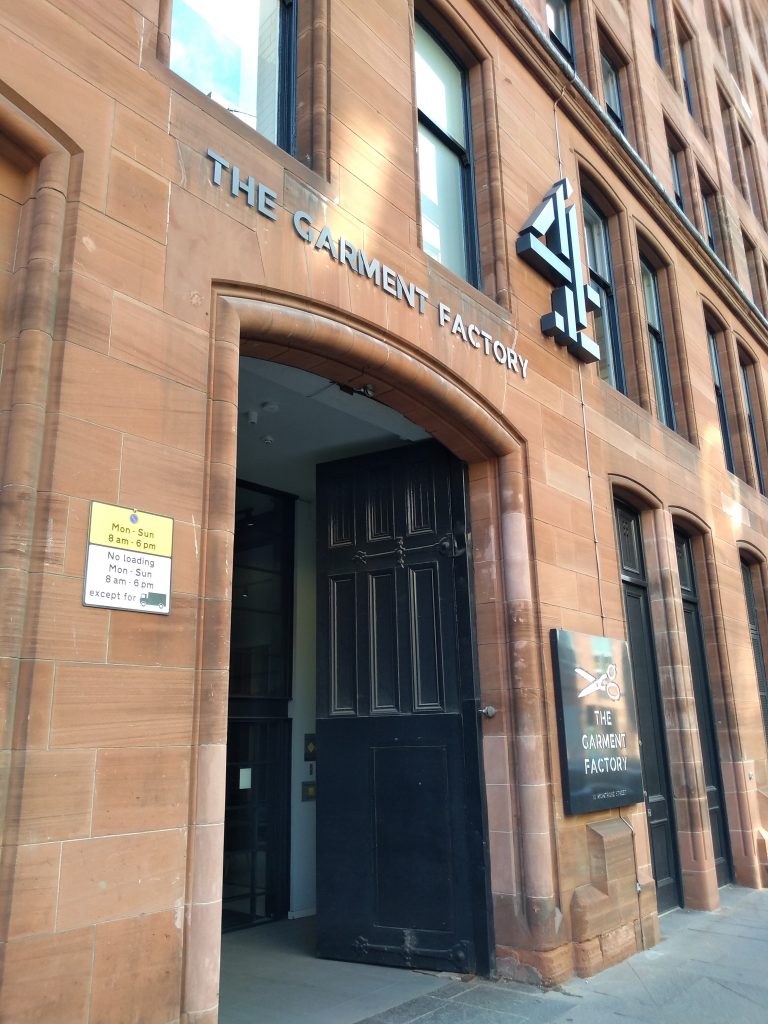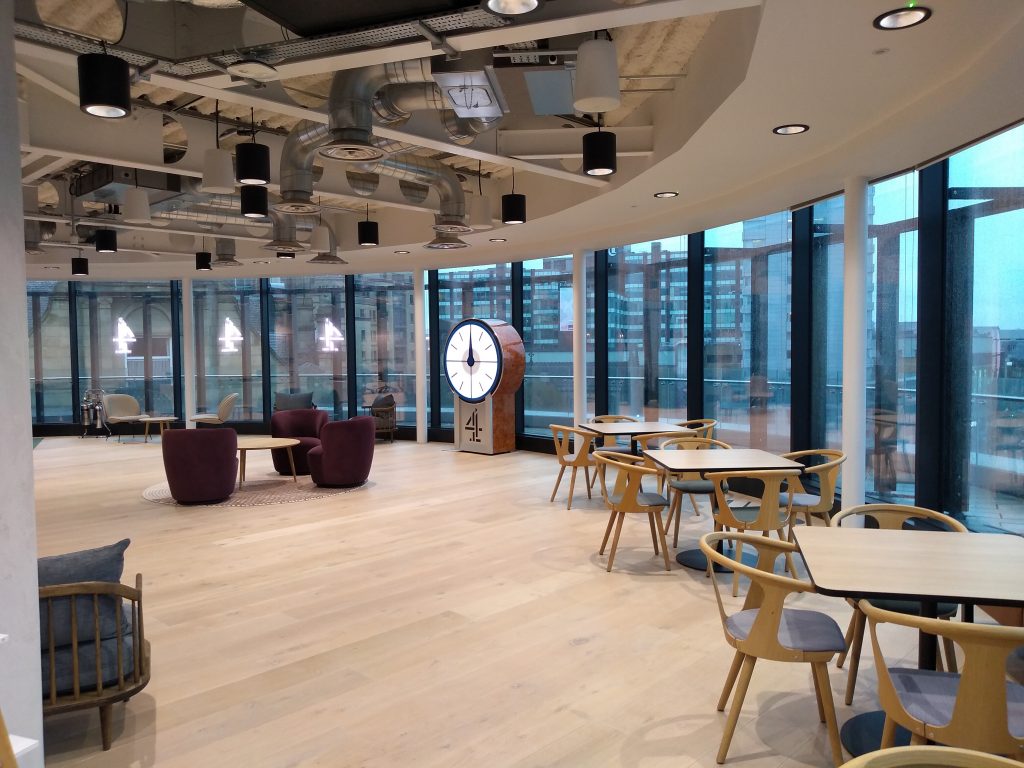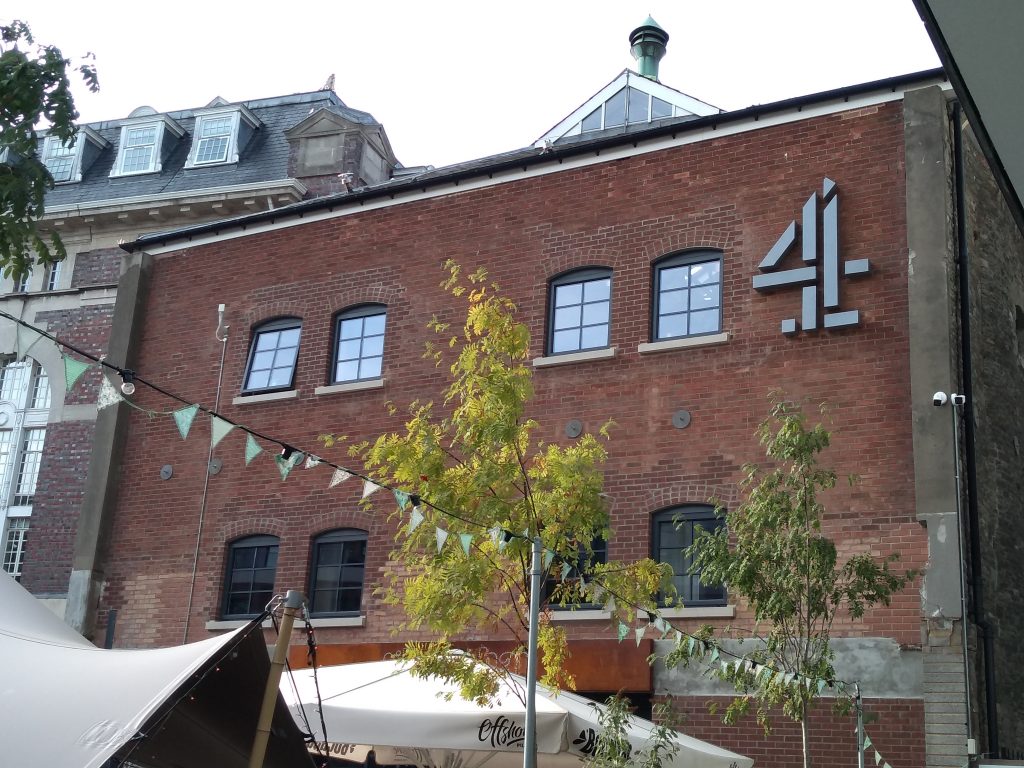by Professor Andrew Spicer, UWE Bristol
Under the mantra ‘4 All the UK’, Channel 4 completed a much-publicised relocation out of London in 2018-19, opening a new headquarters in Leeds and two ‘creative hubs’ in Bristol and Glasgow. Channel 4’s CEO, Alex Mahon, heralded the move as ‘the largest structural shake-up in Channel 4’s history’, claiming that these regional centres made the broadcaster ‘even more open to new talent and fresh voices from underserved areas, able to ‘better reflect the diversity of all the UK … We are becoming more connected to – and rooted in – the lives of the communities that make up Britain.’(1) This article repositions this relocation as a moment in a much longer broadcasting history dominated by London, before examining its significance for Channel 4’s sense of identity as an ‘alternative’ publisher-broadcaster and outlining its initial impact. The conclusion reflects on the issues raised by relocation and the continued importance of locality in a period of uncertainty for the UK’s public service media (PSMs).
Serving the nations and regions
Mahon’s remarks encompass one of the PSM’s principal functions: to reflect the UK’s cultural variety, providing a space for local, regional or national particularities and identities to have a voice. The two publicly owned not-for-profit PSMs, the BBC and Channel 4, in particular, are expected to promote diversity and inclusivity in their programming. The BBC’s charter obliges the corporation to ‘to reflect, represent and serve the diverse communities of all the UK’s nations and regions’ (Public Purpose #4); Channel 4 declared: ‘Our goal is to reflect the full diversity of contemporary Britain on and off-screen’.(2) The UK’s communications regulator Ofcom sets quotas for out-of-London primary spending as a mechanism to encourage the PSMs to produce ‘regional stories, characters, places and issues’ to ensure that television ‘reflects and responds to all the identities and communities of the UK’s increasingly diverse society’.(3) In a revised formulation (June 2019), Ofcom added an economic rider, arguing that regions and nations spending ‘helps to disperse and stimulate investment and job opportunities in the sector throughout the UK’, thereby helping ‘to address geographical imbalances within the national television production industry’.(4) Part of Channel 4’s relocation strategy included a commitment to increase its out of London primary spend from 35 per cent to 50 per cent by 2023, worth £250 million.
What lies buried in these resounding commitments and statutory obligations is broadcasting’s century-long struggle between the metropolis (London) and the ‘peripheries’ (the English regions and the ‘small’ nations – Northern Ireland, Scotland and Wales) over whose voice gets heard. Asa Briggs’s magisterial history of the BBC reveals the nations and regions’ ongoing resentment – lack of resources and autonomy – against the ‘dictatorship of London’, which assumed that metropolitan culture was superior and that the BBC’s prime role was as a unifier – the ‘voice of the nation’. There were repeated calls for ‘powers of control’ to be devolved to the regions and nations to promote their own talent and identities.
The introduction of commercial television in 1955 aimed to counteract the BBC’s London bias: ITV was conceived as an interlocking set of strong, autonomous and distinctive regional broadcasters located in and serving their respective localities. Granada’s chairman, Sidney Bernstein, a committed socialist, thought purchasing the north-west franchise was the opportunity to forge a different type of broadcaster: ‘independent in character and remote from the metropolitan traditions of the BBC. If any English region could contribute to a change in the face of broadcasting this was it’. He built the UK’s first purpose-built television centre – and the most modern in Europe – on Quay Street in central Manchester, fulfilling what Bernstein saw as his civic duty to make the city centre ‘an attractive place where young people can live and enjoy themselves’.(5)
As the ITV franchises merged in the 1990s under market pressure to produce a single international broadcaster, ITV plc located in London, the BBC – under pressure from a Labour government (1997-2010) committed to encouraging significant regional growth through Regional Development Agencies and for the creative industries to lead urban regeneration – ‘lifted and shifted’ five whole departments from London to Salford in Greater Manchester. Despite its scale, the move has been critiqued for its failure to work with local talent and that the creation of MediaCityUK, in which the BBC is the ‘anchor’ tenant, took no real account of the wider regional identity of Salford, one of the UK’s most economically and socially deprived areas, but instead exemplified a ‘neoliberal tradition of market-oriented and property-led urban development strategies’,(6) designed to create a second UK global hub capable of attracting major international firms.
A new type of broadcaster
Channel 4’s attempt to serve the nations and regions is predicated on two factors: its founding remit to demonstrate innovation, experiment and creativity in the form and content of programmes, appeal to the tastes and interests of a culturally diverse society thereby exhibiting a distinctive character, and its constitution as a publisher-broadcaster that commissions programmes rather than produces them, working with a range on independent production companies (indies) across the UK. However, according to Maggie Brown in her recently extended history (2021), Channel 4’s central London location meant that the majority of its programmes were made by London-based indies, thereby reinforcing broadcasting’s metropolitan bias. In order to redress this imbalance, a new Glasgow-based senior post was created in 2002, Director of Nations and Regions with overall responsibility for Channel 4’s strategy and corporate development outside London. Its first incumbent, Stuart Cosgrove, thought small indies across the UK are, ‘by their nature, are closer to ideas, popular influences and cultural change’.(7) This concept remains Channel 4’s core policy, working with indies that demonstrate ‘genuine roots and commitment to a given region’.(8) Despite this commitment, commissioners remained in London leaving indies frustrated at having to travel there to pitch ideas to the Channel 4’s metropolitan commissioners, the ‘£125 cappuccino’ as it became known.
‘4 All the UK'
Like the BBC, Channel 4 came under intense political pressure to increase its role in the nations and regions or risk privatisation. Although Channel 4 was initially resistant, arguing that the solution was to increase regional spending rather than go through the expense of relocating, a move was embraced by Alex Mahon, appointed CEO in October 2017, instigating a very public and therefore in a sense transparent competition in which cities that fulfilled certain criteria – including being within four hours travel time to London and a well developed physical and digital infrastructure – could bid to host the broadcaster. The competition opened a Pandora’s box in which deeply embedded, often centuries-long, animosities between the UK’s major cities flared up, reminding everyone that inter-city rivalries often trump a shared sense of non-metropolitan identity. A great deal of time, and often considerable amounts of public money, were spent by cities to make an attractive pitch.(9)

The Garment Factory, Glasgow Creative Hub. Photo: Andrew Spicer
What characterised the bids of the three winning cities – creative hubs in Bristol and Glasgow and Leeds as the new headquarters – was the granular detail of their offer, which separated them from the corporate rhetoric of those from Birmingham and Manchester that had been the initial front runners. The winners emphasised youth, multi-cultural diversity – Leeds’ partnership with Bradford was especially significant in this respect – and their contrarian nature: Glasgow promoted itself as ‘a city that likes to challenge authority … alive with attitude’, Bristol as a city that ‘thinks differently’.(10) Above all the bids foregrounded the strength, diversity and connectedness of their independent production sector – innovative, dynamic and digitally savvy. Each city offered an active and engaged partnership with inclusive training schemes that would reach out to under-represented groups; Bristol’s bid talked of ‘a new wave of young, diverse and digitally native talent [that] can accelerate the evolution of the media sector in Bristol with Channel 4’. The winning pitches thus artfully mirrored Channel 4’s own values, including its core 16-25 demographic, and sense of itself as a radical broadcaster – the current preferred term is ‘mischief-making’ – still committed, after forty years, to be ‘disruptive’ and to ‘champion unheard voices’.
Working with cities

Channel 4 National HQ, Leeds. Photo: Andrew Spicer
Relocation signalled a step change in Channel 4’s mode of operation – from working with companies to working with cities – in a range of civic partnerships through which the broadcaster could make a genuine difference. Unsurprisingly, the most far-reaching effects have been in Leeds where its headquarters are located, now housing over 200 staff, including the nations and regions staff and the 150 who compose the 4Studio team, the broadcaster’s in-house digital content team that has grown rapidly, recruiting mainly staff from northern England. Channel 4 co-funds a Screen Hub in Bradford and supports the town’s 2025 bid to become a City of Culture; it works with Screen Yorkshire and other agencies to train and support regional talent, including the Content Creatives Programme that offers opportunities to lower socio-economic groups; and its arrival has attracted other businesses – including new studio space on Whitehall Road – part of an estimated additional £1 billion income and c. 1,200 jobs in the region over the next decade. Leeds is now firmly on the UK’s ‘media map’, a decade after the BBC’s move had championed Manchester.

Finzels Reach, Bristol Creative Hub. Photo: Andrew Spicer
The Bristol and Glasgow hubs are much smaller – 15-20 staff – but have also succeeded in partnering various initiatives that also target under-represented groups. The national 4Skills training schemes have been locally inflected; the Bristol hub’s New Writers scheme launched in September 2022, for example, is open only to south-west authors whose scripts must reflect ‘the lived experience of people in the region, with a particular focus on diverse perspectives’. The scheme is designed to enhance Bristol’s scripted offer, historically overshadowed by Cardiff as the BBC’s Centre of Excellence for Drama. Although continuing to be predicated on the quality of the ideas rather than location, all three cities have championed their local indies, especially in offering access to the Emerging Indie and Accelerator funding schemes that were established to support relocation, the latter available only to those led by minority ethnic talent. Overall, the arrival of a national broadcaster has been a huge affirmation of these cities’ identities as dynamic, forward-thinking, aspirational ‘creative cities’ and offers the prospect, unrealisable a generation ago, that a media career can be forged without going to London.
The importance of place
There are distinct limitations to Channel 4’s relocation strategy, which eschewed a radical realignment of the UK’s broadcasting locations in favour of targeting established ‘hot spots’ with developed infrastructural networks in ‘first tier’ cities. There was no attempt to relocate to conspicuously ‘underserved areas’, although the Leeds headquarters is sited in the media ‘desert’ of north-east England. Thus relocation has only made a limited impact in addressing the ‘geographical imbalances’ Ofcom discerned. Within its chosen cities, Channel 4 played safe, siting its offices in areas already on the up rather than attempting to spearhead more extensive urban regeneration. Most obviously, Channel 4 is not fully regional, the majority of its employees continuing to be located in its London offices, which also houses the most important staff: Alex Mahon as CEO and Chief Content Officer Ian Katz. Companies I spoke to often resented the continual ‘referring upwards’ of key commissioning decisions rather than affording the regions the autonomy to shape the broadcaster’s agenda, which would constitute a more radical form of decentralisation than Channel 4 seems prepared to endorse at present.
However, the foregoing analysis has outlined some of the positive and progressive changes that relocation has had on Channel 4 as it shifts from working with companies to working in partnership with its host cities to realise the vision set out by Mahon. These civic partnerships, and its availability to local indies, attempt to avoid the pitfalls of a ‘lift and shift’ policy that might benefit the broadcaster but not the host region and to embed Channel 4 in its chosen localities. Each city has benefitted significantly from the broadcaster’s arrival, especially Leeds as its new headquarters, and Channel 4’s presence has enhanced each city’s ‘brand’ creating spill-over investment, infrastructural improvements and additional business arrivals. These positive impacts have been slowed by two unrelated factors. The first was the pandemic – almost as soon as the new offices were open, they were closed to comply with lockdown. The second was the Conservative government’s determination to privatise Channel 4 in the face of overwhelming opposition from the industry, academia and most informed opinion and that the broadcaster’s relocation would seem a discernible instance of the government’s ‘levelling up’ agenda. One local authority officer in Leeds thought the threat of privatisation delayed meaningful strategy meetings with Channel 4 to discuss future policy by almost eighteen months. Thankfully, at time of writing, November 2022, newspapers have been reporting that privatisation has been ‘quietly shelved’.
Although Channel 4 appears to be in robust financial shape, like all the UK’s PSMs it faces a difficult and uncertain future in a media landscape dominated by the cash-rich streaming platforms that have no national or regional ties and obligations. In addition to serving the diversity of Britain’s nations and regions, the PSMs are expected to be national broadcasters, providing news services and a broad range of programming, including coverage of national occasions – royal weddings, state funerals and major sporting events – thereby fostering a sense of the UK as a unified nation, a ‘national community’. They are expected to be commercial as well as cultural organisations, competing as global players, producing programmes with high production values whose audience appeal is world-wide. Channel 4 commissioners state openly that their central preoccupation is with the formulaic ‘returning series’ rather than programmes whose prime motivation is cultural diversity. Thus the PSMs are institutions with conflicting, often contradictory, aims and purposes.
Nevertheless, despite these contradictions, Channel 4’s relocation should be applauded as a progressive force for democratic change that contributes both economic and cultural value. It is a change that will take time – and consistent political support – to realise completely. Despite the ubiquity of online meetings and the emergence of the metaverse, everyone I spoke to emphasised the importance of locality, of a boots-on-the-ground physical presence. Perhaps in the longer term Channel 4 will become a fully devolved, regionally embedded broadcaster, one that, like the old ITV franchise holders, promotes a diverse range of voices from across the UK. If that is so, Channel 4 can become an even more important element in a responsive, accountable media ecology no longer so dominated by London.
About the Author
Andrew Spicer is Professor of Cultural Production at the University of the West of England Bristol. He has published extensively about media industries and written about regional production in: ‘A Regional Company? RED Production and the Cultural Politics of Place’, Journal of British Cinema and Television (2019) and, with Steve Presence, Go West! Bristol’s Film and Television Industries (2017, revised 2022). He is currently developing a broader project exploring the politics of regional production and is engaged on research on Channel 4, and Bristol as the global centre for Natural History film-making.
Bibliography
(1) Foreword to For People like Us, For People like You, Channel 4, 2020.
(2) ‘Creative Diversity', https://www.channel4.com/commissioning/4producers/creative-diversity, accessed 18 November 2022.
(3) Ofcom, Annual Plan 2005/6, https://www.ofcom.org.uk/__data/assets/pdf_file/0017/7280/annual_plan0506.pdf, 2005, p. 56.
(4) Ofcom, Review of Regional TV Production and Programming Guidance Statement, June 2019, pp. 1/4.
(5) Buscombe, Ed. (ed.), BFI Dossier Number 9 – Granada: The First 25 Years, London: British Film Institute, 1981, pp. 121/67.
(6) Christophers, Brett, ‘The BBC, the Creative Class, and Neoliberal Urbanism in the North of England’, Environment and Planning A, vol. 40, 2018, p. 2318.
(7) Quoted in Kidd, Mike and Bill Taylor, Television in the Nations and Regions: Television Broadcasting Outside London, London: Independent Television Commission, 2002, p. 27.
(8) Channel 4’s Response to the DCMS Consultation Increasing the Regional Impact of Channel 4, April 2017.
(9) For more detail on the competition see Lee, David, Katherine Champion and Lisa Kelly ‘Relocation, Relocation, Relocation: Examining the Narratives Surrounding the Channel 4 Move to Regional Production Hubs, Cultural Trends, vol. 31, no. 3, 2022, p. 227.
(10) Glasgow’s bid, G4C4 and Bristol’s bid, Invent the Future of Channel 4 in Bristol, author’s possession.